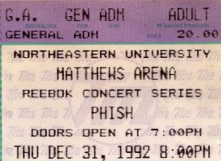
RR: And how was that New Aud show in Worcester on December 31, 1991?
DS: The first thing that comes to mind of that show was that they actually had a barrier between the crowd and the stage. I’m sure it had happened before but that was the first time I’d seen it at a Phish show. It kind of freaked me out a bit. Normally, you could just walk up to the stage, and put your hands on the stage and use it as a table for your setlist if you needed to, but I thought, “Wow, this is a real venue. There’s actually a barrier there.” It was really cold, seasonally cold, and the show had sold out and a lot of people had tried to use their first night buttons to get in, which didn’t work.
It was the first time where it felt like they were trying to make an event out of New Year’s Eve. I think some of that was frustration about 1990. They played three sets for the first time. They played “McGrupp,” which was my first one, and it wasn’t a bust out, but it was rare at least for the time. Trey had that little insult box during “Wilson,” which was amusing. It started to feel like this isn’t going to be another show; this is going to be something different.
RR: What was the scene like outside the venue? Was it more controlled back then?
DS: It was very controlled. It was still very small. There was not a huge line to get in. I had to show up very early because my friends kind of forgot to get me a ticket, so I had to find an extra. I was there working on trying to get an extra, and finally found one. And I was the only person doing that until around an hour or so before the show.
RR: Where were you at in college in late 1991?
DS: I graduated in the fall of ’91. Then, I took about four months off and saw shows for a while, and then went to grad school in the fall of ’92 in New Mexico.
RR: At that point in time, did you feel that what you were doing as a hobby and what you were pursuing as a career would ever intersect?
DS: No, not at all. Actually, it had been a running joke at grad school. I’d come back from a show, and give lots of details about the set, and then say, “Now ask me what the fundamental theorem of algebra is.” When someone would, I’d answer, “I don’t know.”
RR: The crowd capacity for the 1992 New Year’s Eve show expanded even further to 6,000 when Phish played Matthews Arena at Northeastern University in Boston.
DS: Actually, I can tell you exactly what it is because I have the snap sign on my wall. I have the snap sign, and I also have the exclamation of what the snap sign is. On it, it says, yeah, 6,000 people—“hearing 6,000 people screaming in terror.”
It was definitely starting to get bigger. I had been in rec.music.phish for about three months. Once I went to grad school, I had access to the Internet. That changed things. That started to feel like more of a community. You’d go there and you’d meet up with people. You wouldn’t go there alone as much. “Oh, you’re going, too? O.K. Cool. Let’s meet up.” I remember it was a big deal because I saw Shelly who was walking outside the show: “Hey, it’s Shelly!” [Shelly Culbertson worked with Phish’s management company, Dionysian as an Internet liaison and helped develop the Phish Tickets By Mail and ticket distribution system, while also managing the gateway for the original Phish.Net Digest.] There was already a sense that certain people were becoming noticeable. It was definitely starting to get bigger. There were people sitting outside to get in the front row for five or six hours before the show for that one. So it started to become a more interesting thing. They threw those signs out into the crowd, and a lot of people wanted them.
RR: Brad Sands was dressed as the Famous Mockingbird.
DS: Yes, and he was dangled from the ceiling. The Dude of Life came out on stage wearing a Ronald Reagan mask, pushing a lawnmower, and singing “Diamond Girl.” That was the bustout of “Kung,” the first one, I believe, since the 80s [11/2/89]. So, it was starting to become a bigger deal. There were starting to be actual antics.
RR: You mentioned the Internet. Obviously, the Net and Phish’s community developed at the same time during the 1990s. At that time, did you feel this Internet connection was going to push the band forward, or did you feel it was just a social network and a means to stay in touch with other fans?
DS: I actually saw that it was doing that job. The fourth band to get a user group in the rec.music hierarchy was rec.music.phish. There was rec.music.beatles, rec.music.gdead, and I believe the the next one was rec.music.phish [after rec.music.dylan].
RR: Which was quite an accomplishment at that point in time.
DS: Yeah, and a lot of people were mad. “Who is this Phish band? Why should they get their own rec.music-level news group? I haven’t even heard of them.” I definitely felt it. There’s that thin line there. I think the Internet destroys bands now. There were times when all it did was promote. They got so lucky.


No Comments comments associated with this post